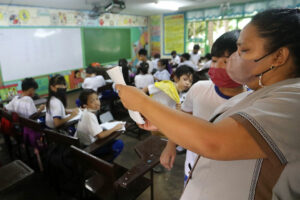A PHILIPPINE senator on Monday called on the government to effectively carry out a national learning intervention program geared toward literacy and basic math skills to boost the performance of Filipino students in global assessments.
In a statement, Senator and Basic Education Committee Chairman Sherwin T. Gatchalian said the Academic Recovery and Accessible Learning Program (ARAL) bill, which was signed into law last month, would build basic literacy and number skills starting at the kindergarten level.
“In addressing the education crisis facing our country, it is crucial to ensure that our students can read and comprehend what they are reading,” he said in Filipino. “Through the implementation of the ARAL program and other reading initiatives we are promoting, we can help our youth build a strong foundation for their education.”
The ARAL Act, a priority measure of President Ferdinand R. Marcos, Jr., tasks the Department of Education (DepEd) to come up with a national learning intervention program to help struggling students catch up with academic standards for their grade levels.
“This law demonstrates our collective resolve to uplift the state of education in the Philippines,” Education Secretary Juan Edgardo “Sonny” M. Angara said at the signing ceremony at the presidential palace on Oct. 18.
“With ARAL, we can help students regain their momentum and achieve the learning milestones they deserve,” he added.
Under the law, tutorial sessions would be provided by the agency through face-to-face, online or blended learning methods.
Mr. Gatchalian also pushed more mandatory learning camps to help Filipino students keep up with basic subjects.
Only 52% of students in Grades 1 to 3 have “grade-ready” reading abilities, he said, citing data from DepEd last year.
Filipino students were among the weakest in the Programme for International Student Assessment (PISA) 2022 global assessment for student performance in mathematics, reading and science, ranking 77th out of 81 countries and performing worse than the global average in all categories.
The assessment showed that only 76% of the country’s 15-year-old students reached minimum proficiency reading.
The Philippines placed 22nd out of 111 countries in the 2022 English Proficiency Index by Education First. — John Victor D. Ordoñez

